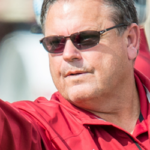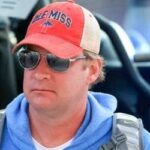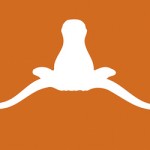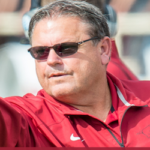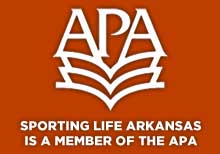
Imagine you’re a 12-year-old Basil Shabazz.
Like most kids, you crave acceptance. Unlike most kids, the acceptance you want the most isn’t from classmates. It’s from your own parents.
You rarely see your father, but over time that kinda, sorta becomes O.K. Some of your friends are in the same boat and nobody’s drowned yet. What gets you – what at a certain level will never stop getting you – is your mother’s rejection. Your mom, a gambling addict, up and left you and your siblings in Pine Bluff and headed to her hometown San Diego with the excuse of finding work. Two Greyhound bus tickets and a few nights later, you and your older brother are knocking on her door.
It doesn’t work out. She isn’t any more ready to provide for her children now than she was in Arkansas. Soon enough, you’re on that bus again, heading to a home with no parents.
The pain is there, always will be. You can’t run from it. But soon enough, you find you can run from just about everything else.
***
Shabazz.
Say the word in most states, an image of a genie, magic lamp, or young basketball pro with the last name ‘Muhammad’ springs to mind.
But here in Arkansas, the name conjures visions of our greatest all-around athlete. The guy who was the very definition of “natural” – who, instead of lifting weights in the off-season, annually lifted the fortunes of his football, then basketball, then track and baseball teams. The guy who to this day remains the only Arkansan to win the National Sports News Services’ USA High School Athlete of the Year award. And, to this day, remains one of the most tantalizing “What-if” stories in Razorback lore.
If you want to better understand how Basil Shabazz rose to the top of the prep athletic world, read Nate Olson’s article in SYNC this week. In it, we learn how Shabazz’s lack of parental guidance might have fueled early success but derailed his chances of sustaining it. For instance, young Shabazz developed a form of “cross training” most children wouldn’t be allowed to even attempt:
He chased and caught rabbits with his bare hands. His strategy was to steer the rabbit to the pavement, where it lost traction, then scoop it up. Shabazz also worked out on the railroad tracks, running from tie to tie without his feet hitting the gravel in between, and running on the rails.
Both of those exercises could have resulted in injury, but Shabazz claims he rarely fell. “When I ran on the rails, I tried to see how fast and far I could go. I made a game out of it and tried to beat my record each time,” Shabazz says.
His other favorite pastime was swimming in the Safeway loading dock. After a heavy rain, water collected in the dock, and Shabazz swam laps.
“I think all of those things helped,” he says. “It helped me get quick feet and gave me lateral quickness and kept me in shape.”
Seriously: what kind of kid spends hours and hours alone on train tracks, tempting fate with every bound? Who runs to a nearby grocery store during thunderstorms, only to jump into its overflowing loading dock?
It’s clear Shabazz was a kid seriously in need of distractions, no matter how ill-conceived or dangerous, and didn’t have parents to steer him elsewhere.
He found a home in sports, and in the love of the families of his best friends/teammates Torii Hunter and Carlos James. But it cannot be forgotten that our state’s most gifted athlete was playing with a severe handicap – no strong parental guidance to push him in academics, or help him navigate the series of critical decisions he faced as high school graduation drew near.
***
As a hotshot running back and safety – one of the nation’s 10 best players according to recruiting analyst Tom Lemming – Shabazz had plenty of suitors for his football services. His stock shot through the roof after a senior season capped by a 5-touchdown performance against Texarkana in the state finals.
In 2004, Mayflower football coach George Jones said of Darren McFadden, whom he’d coached against at the high school level: “He’s the best running back I have seen since Shabazz. He’s not in Shabazz’s class, but he’s probably as good as anybody else that has been through the state.”
Shabazz’s top three football choices were Miami, Houston and Arkansas, with Arkansas in the driver’s seat, according to the Arkansas Democrat-Gazette. Shabazz’s mother wanted him to go to Fayetteville. And the Razorbacks’ head coach Jack Crowe had endeared himself to Crowe. “That was my boy,” Shabazz recalled. Indeed, the University of Arkansas offered Shabazz a $1 million insurance policy as an incentive for signing. [at 2:40 mark in this interview]
But Shabazz passed. He was burning out on football, and had other, more lucrative-in-the-short-term options to pursue. He could sign a Nike track deal and train for the 1992 Olympics, or sign with a Major League Baseball team.
Complicating matters, Shabazz had failed to qualify to play college football. He didn’t make the required 2.0 GPA. A simple shortcoming, but with years of frustrating, tangled consequences.
If Basil Shabazz had strong, parental guidance, maybe he would have decided getting a college education out of the gate is the smart thing to do, even if there’s no quick cash attached. Maybe he would have been told to be more patient, to put baseball on the backburner, or sideburner, while in college. That if Bo Jackson could do it, so could he.
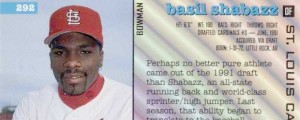 But Shabazz didn’t have that luxury. In a town where young black males are killed at alarming rates every week, he didn’t have the luxury of time. Baseball was a quick out, and fun one at that. Plus, it offered more years of professional pay in the long run. The St. Louis Cardinals selected Shabazz in the third round, signed him to a reported 3-year, $100,000 (according to Democrat-Gazette articles) and whisked the centerfielder off to small-town Appalachia. Shabazz’s play didn’t exactly set Johnson City, Tenn. on fire.
But Shabazz didn’t have that luxury. In a town where young black males are killed at alarming rates every week, he didn’t have the luxury of time. Baseball was a quick out, and fun one at that. Plus, it offered more years of professional pay in the long run. The St. Louis Cardinals selected Shabazz in the third round, signed him to a reported 3-year, $100,000 (according to Democrat-Gazette articles) and whisked the centerfielder off to small-town Appalachia. Shabazz’s play didn’t exactly set Johnson City, Tenn. on fire.
By the following March, he was having serious doubts. He called Crowe, his favorite college coach, and told him he wanted to play for the Razorbacks. Crowe said they would keep a spot open for him.
To make college happen while Shabazz honored his contract, he would have to end his baseball season early and report late the next spring. The hope was to enroll at Arkansas in fall 1992, sit out a year while paying his own way, then be eligible to play football on scholarship in fall 1993 as a junior. In total, he’d miss about six weeks of baseball in the span of three years to attend college and play football.
The decision came down to the Cardinals and the UA. If they said yes, Shabazz would be on his way to Fayetteville. But if they said “no,” the window to be a Razorback was essentially closed. After 1992, the SEC wouldn’t allow the enrollment of students under Proposition 48, which stipulated athletes who didn’t qualify academically in high school must sit out a season before qualifying for athletic eligibility.
Crowe lobbied for leniency from St. Louis. “I think he’s as good a high school player as has ever come out,” he told the Democrat-Gazette. “That doesn’t mean he’ll be a great college player. But I’ll say this: To anybody who has seen him play football, his potential is obvious. I don’t think it’s as obvious in baseball. But that’s up to the Cardinals and Basil to decide.”
To help sway that decision making, Crowe asked Hog fans to write letters to the Cardinals asking that the organization be sensitive to fans who are loyal to the Cardinals and their AA-affiliate in Little Rock, as well as to the Razorbacks.
As the August 28th deadline for late registration approached, things didn’t look good for Shabazz. He insisted he’d honor his commitment to St. Louis no matter what the organization decided, but one of his bosses thought otherwise. “He’s been telling people he just signed to play baseball for the cash, that he’s really a football player,” Johnson City General Manager Lonnie Lowe told the Democrat-Gazette.
Shabazz never enrolled at the UA. The school waived an appeal for his admission despite his failure to meet its criteria, Olson wrote. When Crowe was asked about this on August 27, 1992, he told the Democrat-Gazette: “I’m disappointed, because I think Basil is a great athlete and I really, sincerely think he wanted to play football at the University of Arkansas. I think it’s maybe the most important thing for him right now. So, I’m very disappointed for Basil and the people of the state of Arkansas because they’re not getting to see a player they identify with.”
Shabazz stuck it out with the Cardinals organization for the next few seasons, but never developed into the player they had envisioned. His choice to go with baseball in 1991, and his inability to find wiggle room in his contract the following year, would have unexpected – and ironic – consequences in 1994.
That October, Shabazz and Torii Hunter were arrested at the University of Central Arkansas while visiting friends on campus. A campus policeman had found a handgun on Shabazz, who didn’t know about laws forbidding firearms on campus. Police also found a marijuana joint in the vehicle Shabazz and Hunter had traveled in, which was owned by a mutual friend.
Shabazz told Olson the arrests happened because he and Hunter were simply in the wrong place at the wrong time. But, there was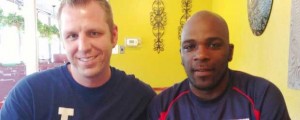 another reason: “I think I was targeted because I turned down a lot of [tuition] money from Fayetteville.”
another reason: “I think I was targeted because I turned down a lot of [tuition] money from Fayetteville.”
The long-time Razorback fan, who had so badly wanted to go to Fayetteville in 1992, felt he was being punished for a decision made one year earlier.
The charges were eventually dropped but publicity surrounding the arrest meant plenty damage to Shabazz’s image had already been done. The Cardinals released Shabazz the day after his arrest. They cited his lack of progress as a player as the most important reason. A few years later, Shabazz had entirely retreated from the limelight. He found a new life in Texas.
It’s this new life – one filled with loving parents, a stable household, stable jobs, a strong Christian faith – which propelled Shabazz to open up to Olson. You’ve got to think he now has nearly verything he so dearly craved as a 12-year-old, on a bus ride back from San Diego, looking out at a vast desert surrounding him. Family mattered to Shabazz long before big-time sports did. And it has mattered to him long after his MLB and NFL dreams died for good.
He constantly shares his story with the kids he now helps train and coach. He wants to give them every chance to fulfill their athletic promise in ways he didn’t. He insists he doesn’t wrestle with thoughts of what-could-have-been, but he’s willing to indulge when given the chance.
“I think I would have been a Hall of Famer in anything I would have done,” he told Olson. “Not only myself – I think anybody that knows me, knows that. Whatever I set my mind to, I reach that.”
I can’t help it.
I can’t help wondering what would have happened if, all those years ago, high schooler Basil Shabazz had set his mind to studying hard. If he allowed Jack Crowe to fulfill his recruiting promises and become a father figure to him. And if he walked onto campus in the fall of 1991 ready to contribute wherever needed, whether at running back, special teams or defensive backfield.
How good would Shabazz have been? Today, would he be mentioned in the same breath as All-Americans Steve Atwater and Felix Jones? Or, perhaps, prep superstars-turned-Razorback flops like Dedrick Poole and Darius Winston?
Evin Demirel writes for national and local sports publications. Follow him here.


